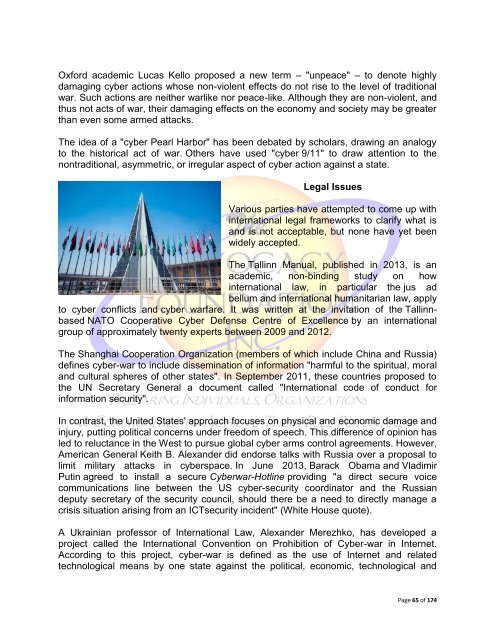International Cyber Terrorism
International Cyber Terrorism
International Cyber Terrorism
- No tags were found...
You also want an ePaper? Increase the reach of your titles
YUMPU automatically turns print PDFs into web optimized ePapers that Google loves.
Oxford academic Lucas Kello proposed a new term – "unpeace" – to denote highly<br />
damaging cyber actions whose non-violent effects do not rise to the level of traditional<br />
war. Such actions are neither warlike nor peace-like. Although they are non-violent, and<br />
thus not acts of war, their damaging effects on the economy and society may be greater<br />
than even some armed attacks.<br />
The idea of a "cyber Pearl Harbor" has been debated by scholars, drawing an analogy<br />
to the historical act of war. Others have used "cyber 9/11" to draw attention to the<br />
nontraditional, asymmetric, or irregular aspect of cyber action against a state.<br />
Legal Issues<br />
Various parties have attempted to come up with<br />
international legal frameworks to clarify what is<br />
and is not acceptable, but none have yet been<br />
widely accepted.<br />
The Tallinn Manual, published in 2013, is an<br />
academic, non-binding study on how<br />
international law, in particular the jus ad<br />
bellum and international humanitarian law, apply<br />
to cyber conflicts and cyber warfare. It was written at the invitation of the Tallinnbased<br />
NATO Cooperative <strong>Cyber</strong> Defense Centre of Excellence by an international<br />
group of approximately twenty experts between 2009 and 2012.<br />
The Shanghai Cooperation Organization (members of which include China and Russia)<br />
defines cyber-war to include dissemination of information "harmful to the spiritual, moral<br />
and cultural spheres of other states". In September 2011, these countries proposed to<br />
the UN Secretary General a document called "<strong>International</strong> code of conduct for<br />
information security".<br />
In contrast, the United States' approach focuses on physical and economic damage and<br />
injury, putting political concerns under freedom of speech. This difference of opinion has<br />
led to reluctance in the West to pursue global cyber arms control agreements. However,<br />
American General Keith B. Alexander did endorse talks with Russia over a proposal to<br />
limit military attacks in cyberspace. In June 2013, Barack Obama and Vladimir<br />
Putin agreed to install a secure <strong>Cyber</strong>war-Hotline providing "a direct secure voice<br />
communications line between the US cyber-security coordinator and the Russian<br />
deputy secretary of the security council, should there be a need to directly manage a<br />
crisis situation arising from an ICTsecurity incident" (White House quote).<br />
A Ukrainian professor of <strong>International</strong> Law, Alexander Merezhko, has developed a<br />
project called the <strong>International</strong> Convention on Prohibition of <strong>Cyber</strong>-war in Internet.<br />
According to this project, cyber-war is defined as the use of Internet and related<br />
technological means by one state against the political, economic, technological and<br />
Page 65 of 174
















